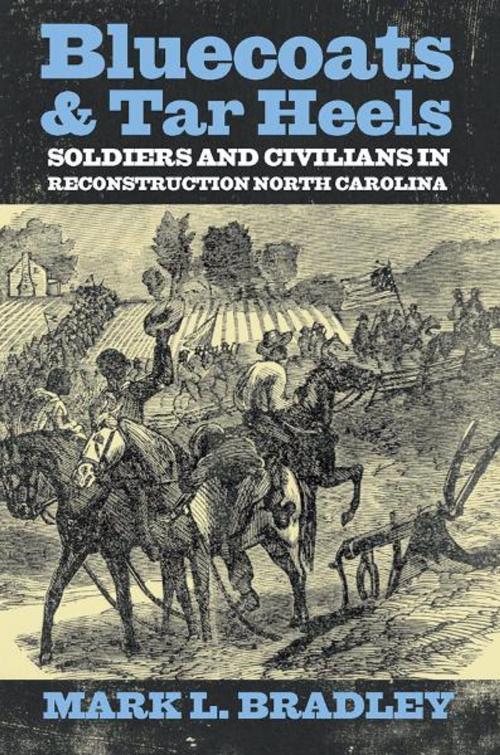Bluecoats and Tar Heels
Soldiers and Civilians in Reconstruction North Carolina
Nonfiction, History, Americas, United States, Civil War Period (1850-1877)| Author: | Mark L Bradley | ISBN: | 9780813138848 |
| Publisher: | The University Press of Kentucky | Publication: | September 30, 2009 |
| Imprint: | The University Press of Kentucky | Language: | English |
| Author: | Mark L Bradley |
| ISBN: | 9780813138848 |
| Publisher: | The University Press of Kentucky |
| Publication: | September 30, 2009 |
| Imprint: | The University Press of Kentucky |
| Language: | English |
Though the Civil War ended in April 1865, the conflict between Unionists and Confederates continued. The bitterness and rancor resulting from the collapse of the Confederacy spurred an ongoing cycle of hostility and bloodshed that made the Reconstruction period a violent era of transition. The violence was so pervasive that the federal government deployed units of the U.S. Army in North Carolina and other southern states to maintain law and order and protect blacks and Unionists.
Bluecoats and Tar Heels: Soldiers and Civilians in Reconstruction North Carolina tells the story of the army's twelve-year occupation of North Carolina, a time of political instability and social unrest. Author Mark Bradley details the complex interaction between the federal soldiers and the North Carolina civilians during this tumultuous period. The federal troops attempted an impossible juggling act: protecting the social and political rights of the newly freed black North Carolinians while conciliating their former enemies, the ex-Confederates. The officers sought to minimize violence and unrest during the lengthy transition from war to peace, but they ultimately proved far more successful in promoting sectional reconciliation than in protecting the freedpeople.
Bradley's exhaustive study examines the military efforts to stabilize the region in the face of opposition from both ordinary citizens and dangerous outlaws such as the Regulators and the Ku Klux Klan. By 1872, the widespread, organized violence that had plagued North Carolina since the close of the war had ceased, enabling the bluecoats and the ex-Confederates to participate in public rituals and social events that served as symbols of sectional reconciliation. This rapprochement has been largely forgotten, lost amidst the postbellum barrage of Lost Cause rhetoric, causing many historians to believe that the process of national reunion did not begin until after Reconstruction. Rectifying this misconception, Bluecoats and Tar Heels illuminates the U.S. Army's significant role in an understudied aspect of Civil War reconciliation.
Though the Civil War ended in April 1865, the conflict between Unionists and Confederates continued. The bitterness and rancor resulting from the collapse of the Confederacy spurred an ongoing cycle of hostility and bloodshed that made the Reconstruction period a violent era of transition. The violence was so pervasive that the federal government deployed units of the U.S. Army in North Carolina and other southern states to maintain law and order and protect blacks and Unionists.
Bluecoats and Tar Heels: Soldiers and Civilians in Reconstruction North Carolina tells the story of the army's twelve-year occupation of North Carolina, a time of political instability and social unrest. Author Mark Bradley details the complex interaction between the federal soldiers and the North Carolina civilians during this tumultuous period. The federal troops attempted an impossible juggling act: protecting the social and political rights of the newly freed black North Carolinians while conciliating their former enemies, the ex-Confederates. The officers sought to minimize violence and unrest during the lengthy transition from war to peace, but they ultimately proved far more successful in promoting sectional reconciliation than in protecting the freedpeople.
Bradley's exhaustive study examines the military efforts to stabilize the region in the face of opposition from both ordinary citizens and dangerous outlaws such as the Regulators and the Ku Klux Klan. By 1872, the widespread, organized violence that had plagued North Carolina since the close of the war had ceased, enabling the bluecoats and the ex-Confederates to participate in public rituals and social events that served as symbols of sectional reconciliation. This rapprochement has been largely forgotten, lost amidst the postbellum barrage of Lost Cause rhetoric, causing many historians to believe that the process of national reunion did not begin until after Reconstruction. Rectifying this misconception, Bluecoats and Tar Heels illuminates the U.S. Army's significant role in an understudied aspect of Civil War reconciliation.















